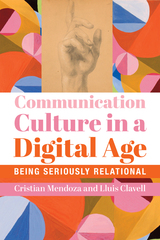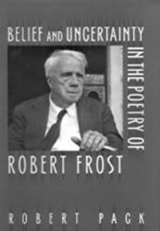

For the last two centuries, literature has tested the authority of the individual and the community. During this time, in David Bromwich’s words, “A motive for great writing…has been a tension, which is felt to be unresolvable, between the claims of social obligation and of personal autonomy. That these had to be experienced as rival claims was the discovery of Burke and Wordsworth. Our lives today and our choices are made in a culture where any settlement of the contest for either side is bound to be provisional. There is nothing to approve or regret in such a situation; it is the way things are; and in a time like ours, it is what great writing lives on.”
With a historical as well as an interpretative emphasis, Bromwich explores this tension. He shows why the public-mindedness of the eighteenth century is as limited a model for readers now as the individualism of the nineteenth century. Calling attention to the ambivalence of the great writers, he cites Emerson’s sense of the conflict between “spirit” and “commodity” and Burke’s conviction that human nature is at once given and chosen. Elsewhere, he describes the attenuation of social concern even in the truest modern followers of the romantics as in the conscious turn away from Wordsworth’s morality in poems by Stevens and Frost. Other topics include Keats’s politics, Whitman’s prose, William Cobbett’s journalism, and the standards of the Edinburgh Review.
In some widely discussed general essays, Bromwich addresses such issues as the uses of biography, the idea that authors create their own worlds, and the political ambitions of recent literary theory. His own criticism is powerfully eclectic, combining history, philosophy, biography, and a subtle awareness of how literature performs its work of implication. He brings to the task an authentic understanding of intellectual culture and the ability to leap from textual detail to cultural observation with an understated grace.
As in his other writing, Bromwich aims to join aesthetic theory and moral thought. He rethinks the relationship between genius and talent, and defines genius in terms of its capacity to bring about change, rather than simply its quality of inward and spiritual uniqueness. His sustained defense here of that conception, and his elegant argument for a new approach to criticism generally, make this thoughtful book a controversial one as well.
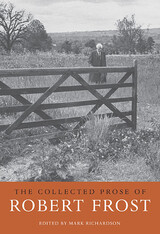
During his lifetime, Robert Frost notoriously resisted collecting his prose--going so far as to halt the publication of one prepared compilation and to "lose" the transcripts of the Charles Eliot Norton Lectures he delivered at Harvard in 1936. But for all his qualms, Frost conceded to his son that "you can say a lot in prose that verse won't let you say," and that the prose he had written had in fact "made good competition for [his] verse." This volume, the first critical edition of Robert Frost's prose, allows readers and scholars to appreciate the great American author's forays beyond poetry, and to discover in the prose that he did make public--in newspapers, magazines, journals, speeches, and books--the wit, force, and grace that made his poetry famous.
The Collected Prose of Robert Frost offers an extensive and illuminating body of work, ranging from juvenilia--Frost's contributions to his high school Bulletin--to the charming "chicken stories" he wrote as a young family man for The Eastern Poultryman and Farm Poultry, to such famous essays as "The Figure a Poem Makes" and the speeches and contributions to magazines solicited when he had become the Grand Old Man of American letters. Gathered, annotated, and cross-referenced by Mark Richardson, the collection is based on extensive work in archives of Frost's manuscripts. It provides detailed notes on the author's habits of composition and on important textual issues and includes much previously unpublished material. It is a book of boundless appeal and importance, one that should find a home on the bookshelf of anyone interested in Frost.
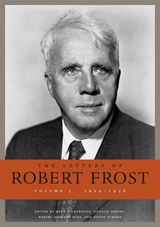
The third installment of Harvard’s five-volume edition of Robert Frost’s correspondence.
The Letters of Robert Frost, Volume 3: 1929–1936 is the latest installment in Harvard’s five-volume edition of the poet’s correspondence. It presents 601 letters, of which 425 are previously uncollected. The critically acclaimed first volume, a Times Literary Supplement Book of the Year, included nearly 300 previously uncollected letters, and the second volume 350 more.
During the period covered here, Robert Frost was close to the height of his powers. If Volume 2 covered the making of Frost as America’s poet, in Volume 3 he is definitively made. These were also, however, years of personal tribulation. The once-tight Frost family broke up as marriage, illness, and work scattered the children across the country. In the case of Frost’s son Carol, both distance and proximity put strains on an already fractious relationship. But the tragedy and emotional crux of this volume is the death of Frost’s youngest daughter, Marjorie. Frost’s correspondence from those dark days is a powerful testament to the difficulty of honoring the responsibilities of a poet’s eminence while coping with the intensity of a parent’s grief.
Volume 3 also sees Frost responding to the crisis of the Great Depression, the onset of the New Deal, and the emergence of totalitarian regimes in Europe, with wit, canny political intelligence, and no little acerbity. All the while, his star continues to rise: he wins a Pulitzer for Collected Poems in 1931 and will win a second for A Further Range, published in 1936, and he is in constant demand as a public speaker at colleges, writers’ workshops, symposia, and dinners. Frost was not just a poet but a poet-teacher; as such, he was instrumental in defining the public functions of poetry in the twentieth century. In the 1930s, Frost lived a life of paradox, as personal tragedy and the tumults of politics interwove with his unprecedented achievements.
Thoroughly annotated and accompanied by a biographical glossary and detailed chronology, these letters illuminate a triumphant and difficult period in the life of a towering literary figure.
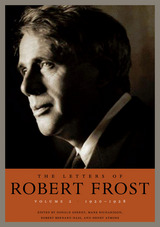
The Letters of Robert Frost, Volume 2: 1920–1928 is the second installment of Harvard’s five-volume edition of the poet’s correspondence. Nearly three hundred letters in the critically-acclaimed first volume had never before been collected; here, close to four hundred are gathered for the first time. Volume 2 includes letters to some 160 correspondents: family and friends; colleagues, fellow writers, visual artists, editors, and publishers; educators of all kinds; farmers, librarians, and admirers.
In the years covered here, publication of Selected Poems, New Hampshire, and West-Running Brook enhanced Frost’s stature in America and abroad, and the demands of managing his career—as public speaker, poet, and teacher—intensified. A good portion of the correspondence is devoted to Frost’s appointments at the University of Michigan and Amherst College, through which he played a major part in staking out the positions poets would later hold in American universities. Other letters show Frost helping to shape the Bread Loaf School of English and its affiliated Writers’ Conference. We encounter him discussing his craft with students and fostering the careers of younger poets. His observations (and reservations) about educators are illuminating and remain pertinent. And family life—with all its joys and sorrows, hardships and satisfactions—is never less than central to Frost’s concerns.
Robert Frost was a masterful prose stylist, often brilliant and always engaging. Thoroughly annotated and accompanied by a biographical glossary, chronology, and detailed index, these letters are both the record of a remarkable literary life and a unique contribution to American literature.
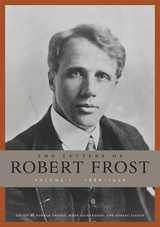
One of the acknowledged giants of twentieth-century American literature, Robert Frost was a public figure much celebrated in his day. Although his poetry reached a wide audience, the private Frost—pensive, mercurial, and often very funny—remains less appreciated. Following upon the publication of Frost’s notebooks and collected prose, The Letters of Robert Frost is the first major edition of the poet’s written correspondence. The hundreds of previously unpublished letters in these annotated volumes deepen our understanding and appreciation of this most complex and subtle of verbal artists.
Volume One traverses the years of Frost’s earliest poems to the acclaimed collections North of Boston and Mountain Interval that cemented his reputation as one of the leading lights of his era. The drama of his personal life—as well as the growth of the audacious mind that produced his poetry—unfolds before us in Frost’s day-to-day missives. These rhetorical performances are at once revealing and tantalizingly evasive about relationships with family and close friends, including the poet Edward Thomas. We listen in as Frost defines himself against contemporaries Ezra Pound and William Butler Yeats, and we witness the evolution of his thoughts about prosody, sound, style, and other aspects of poetic craft.
In its literary interest and sheer display of personality, Frost’s correspondence is on a par with the letters of Emily Dickinson, Robert Lowell, and Samuel Beckett. The Letters of Robert Frost holds hours of pleasurable reading for lovers of Frost and modern American poetry.
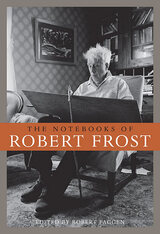
Robert Frost is one of the most widely read, well loved, and misunderstood of modern writers. In his day, he was also an inveterate note-taker, penning thousands of intense aphoristic thoughts, observations, and meditations in small pocket pads and school theme books throughout his life. These notebooks, transcribed and presented here in their entirety for the first time, offer unprecedented insight into Frost's complex and often highly contradictory thinking about poetics, politics, education, psychology, science, and religion--his attitude toward Marxism, the New Deal, World War--as well as Yeats, Pound, Santayana, and William James. Covering a period from the late 1890s to early 1960s, the notebooks reveal the full range of the mind of one of America's greatest poets. Their depth and complexity convey the restless and probing quality of his thought, and show how the unruliness of chaotic modernity was always just beneath his appearance of supreme poetic control.
Edited and annotated by Robert Faggen, the notebooks are cross-referenced to mark thematic connections within these and Frost's other writings, including his poetry, letters, and other prose. This is a major new addition to the canon of Robert Frost's writings.
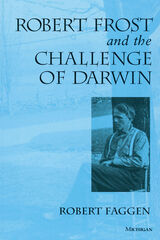
Combining both intellectual history and detailed analysis of Frost's poems, Robert Faggen shows how Frost's reading of Darwin reflected the significance of science in American culture from Emerson and Thoreau, through James and pragmatism. He provides fresh and provocative readings of many of Frost's shorter lyrics and longer pastoral narratives as they illustrate the impact of Darwinian thought on the concept of nature, with particular exploration of man's relationship to other creatures, the conditions of human equality and racial conflict, the impact of gender and sexual differences, and the survival of religion.
The book shows that Frost was neither a pessimist lamenting the uncertainties of the Darwinian worldview, nor a humanist opposing its power. Faggen draws on Frost's unpublished notebooks to reveal a complex thinker who willingly engaged with the difficult moral and epistemological implications of natural science, and showed their consonance with myths and traditions stretching back to Milton, Lucretius, and the Old Testament. Frost emerges as a thinker for whom poetry was not only artistic expression, but also a forum for the trial of ideas and their impact on humanity.
Robert Frost and the Challenge of Darwin provides a deeper understanding not only of Frost and modern poetry, but of the meaning of Darwin in the modern world, the complex interrelations of literature and science, and the history of American thought.
"A forceful, appealing study of the Frost-Darwin relation, which has gone little noted by previous scholars, and a fresh explanation of Frost's ambivalent relation to modernism, which he scorned but also influenced" --William Howarth, Princeton University
Robert Faggen is Associate Professor of Literature, Claremont McKenna College and Adjunct Associate Professor, Claremont Graduate School.
READERS
Browse our collection.
PUBLISHERS
See BiblioVault's publisher services.
STUDENT SERVICES
Files for college accessibility offices.
UChicago Accessibility Resources
home | accessibility | search | about | contact us
BiblioVault ® 2001 - 2024
The University of Chicago Press





